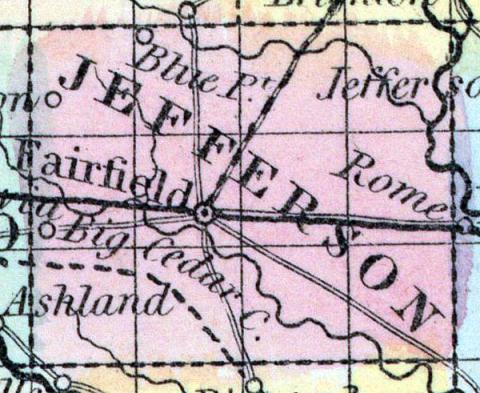FAIRFIELD, a flourishing post-village, capital of Jefferson county, Iowa, on Big Cedar creek, about 50 miles W. by N. from Burlington. A plank-road has been commenced between this point and Burlington; and a railroad has been projected which will connect it with Keokuk. Fairfield is one of the most important towns in the interior of the state, and is the centre of an active trade. It has 2 newspaper offices, a United States land-office, a female seminary, and a college established by the state. Population in 1853, estimated at 1500. (Baldwin's New and Complete Gazetteer of the United States..., 1854)
FAIRFIELD, the county seat of Jefferson county [Iowa], was incorporated by an act of the Legislature, approved February 9th, 1847. On the 12th day of April of the same year, the following officers were elected, to wit: Barnet Ristine, Mayor; George Acheron, Recorder; and E. S. Gage, E. C. Hampson, and J. A. McKerney, Trustees.
By an act of the Legislature approved Jan. 14th, 1857, the town of Fairfield was constituted the “City of Fairfield.” In October, 1847, Fairfield contained a population of 650. It now contains, as before stated, about 2,200. There are at this time seven churches, as follows: Methodist, Presbyterian, Congregational, Lutheran, Episcopal, Christian and Catholic. The Baptists are also preparing to erect a church. There is a substantial brick court house and jail. It also contains a public hall, two good hotels, numerous drug, dry goods and grocery stores, a steam flouring mill, saw mill, foundry, a plow factory, and also a manufactory of threshing machines. In fact, nearly all branches of business usually carried on in thriving towns are found here. There is a post office which receives and distributes a very large amount of matter, there being daily mails from north, south, east and west, besides several tri-weekly and weekly mails. A United States Agency for the payment of pensions has been established here, David B. Wilson being the agent. There is a Lodge of Masons, and also a Lodge of Odd Fellows, both in a flourishing condition. There was also organized in May 1865, a National Bank with a capital of $50,000. The officers are: James F. Wilson, President; Daniel Mendenhall, Vice President; S. C. Farmer, Cashier; C. W. Slagle, R. McElhinny, and J. H. Wells, Directors. (Hair's Iowa State Gazetteer..., 1865)

